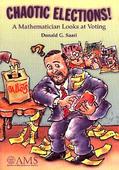Are All Elections Chaotic?
WITH 135 NAMES on the ballot, the confusions of the California recall election may make Florida's stray butterfly ballots look like kindergarten chaos theory.
Or so says Donald Saari, a mathematician at the University of California, Irvine, who claims to list all possible "election paradoxes'' in a slim, accessible volume called "Chaotic Elections!'' (AMS, 2001). According to Saari, we should start to worry about electoral fairness any time a winner fails to obtain a majority of votes - which seems likely in the crowded Golden State race.
Saari sees the potential for "chaos'' in even the simplest election procedures. Take the standard plurality vote, where each voter picks one candidate and the candidate with the most votes wins. Because this method allows voters to name only their first choice, it is biased in favor of what Saari calls "love-him-or-hate-him'' candidates, who may be preferred by a large minority but rank dead last with a clear majority. This likely describes Pat Buchanan when he beat Bob Dole in the 1996 New Hampshire Republican primary, and even Abraham Lincoln when he scraped by Stephen Douglas in 1860, says Saari. It also may describe Arnold Schwarzenegger.
Back in 1770, French mathematician Jean Charles de Borda proposed what he thought was a fairer system. Under the "Borda count,'' voters rank all candidates, who are then assigned points based on those rankings. (A few bodies - including the Cambridge City Council and the governments of Ireland and Australia - still use this method.) But even under this system, outcomes depend on how voters' preferences are weighted.
In 1963, Stanford economist Kenneth Arrow proposed that a problem-free election must meet a few simple conditions. For example, if A ranks ahead of B, and some voters alter their ballots in A's favor, A should still rank ahead of B. Moreover, A coming out ahead of B should have nothing to do with voter preferences for C. But Arrow famously showed that the only voting procedure to meet such conditions was an election with only one voter - a dictatorship, in short. In a democracy, it seemed, elections were inherently chaotic.
By using simple geometrical models, Saari concludes that the Borda count best approximates the will of the people. But California law, he laments, requires the "procedural terrorism'' of a plurality recall. "It remains within the realm of possibility that California could inadvertently elect a porn queen, or an unqualified candidate with an interesting-sounding name,'' he says.
The fact that California will hold two independent votes at once - should the governor be recalled? if so, who should replace him? - adds further wrinkles. While Gov. Gray Davis needs a majority to stay in office, Saari points out, he could be ousted by someone claiming as little as 5% of the vote. "The likelihood that half of the voters will approve the outcome is next to zero,'' he says. "Indeed, the likelihood that even 20% of the voters will approve of both outcomes could be very small.''
At least this is not a new problem for California: In 1990, when there were 28 propositions on the ballot, Saari claims that not a single voter voted the same way the state did as a whole.
